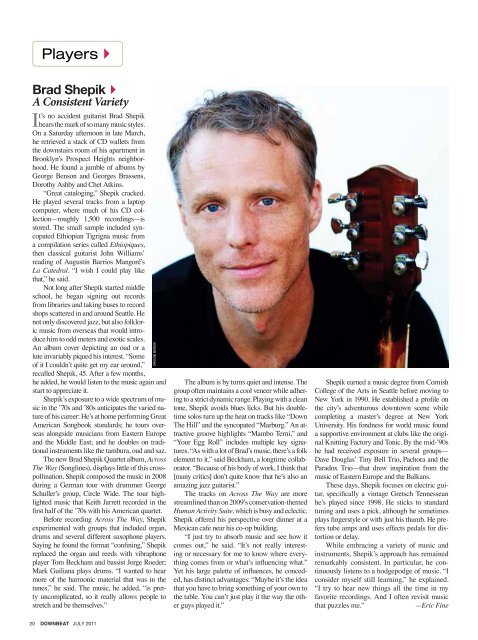Wessell Anderson Gerry Hemingway Dave Stryker John ... - Downbeat
Wessell Anderson Gerry Hemingway Dave Stryker John ... - Downbeat
Wessell Anderson Gerry Hemingway Dave Stryker John ... - Downbeat
Create successful ePaper yourself
Turn your PDF publications into a flip-book with our unique Google optimized e-Paper software.
Players �<br />
Brad Shepik�<br />
A Consistent Variety<br />
It’s no accident guitarist Brad Shepik<br />
bears the mark of so many music styles.<br />
On a Saturday afternoon in late March,<br />
he retrieved a stack of CD wallets from<br />
the downstairs room of his apartment in<br />
Brooklyn’s Prospect Heights neighborhood.<br />
He found a jumble of albums by<br />
George Benson and Georges Brassens,<br />
Dorothy Ashby and Chet Atkins.<br />
“Great cataloging,” Shepik cracked.<br />
He played several tracks from a laptop<br />
computer, where much of his CD collection—roughly<br />
1,500 recordings—is<br />
stored. The small sample included syncopated<br />
Ethiopian Tigrigna music from<br />
a compilation series called Ethiopiques,<br />
then classical guitarist <strong>John</strong> Williams’<br />
reading of Augustín Barrios Mangoré’s<br />
La Catedral. “I wish I could play like<br />
that,” he said.<br />
Not long after Shepik started middle<br />
school, he began signing out records<br />
from libraries and taking buses to record<br />
shops scattered in and around Seattle. He<br />
not only discovered jazz, but also folkloric<br />
music from overseas that would introduce<br />
him to odd meters and exotic scales.<br />
An album cover depicting an oud or a<br />
lute invariably piqued his interest. “Some<br />
of it I couldn’t quite get my ear around,”<br />
recalled Shepik, 45. After a few months,<br />
he added, he would listen to the music again and<br />
start to appreciate it.<br />
Shepik’s exposure to a wide spectrum of music<br />
in the ’70s and ’80s anticipates the varied nature<br />
of his career: He’s at home performing Great<br />
American Songbook standards; he tours overseas<br />
alongside musicians from Eastern Europe<br />
and the Middle East; and he doubles on traditional<br />
instruments like the tambura, oud and saz.<br />
The new Brad Shepik Quartet album, Across<br />
The Way (Songlines), displays little of this crosspollination.<br />
Shepik composed the music in 2008<br />
during a German tour with drummer George<br />
Schuller’s group, Circle Wide. The tour highlighted<br />
music that Keith Jarrett recorded in the<br />
first half of the ’70s with his American quartet.<br />
Before recording Across The Way, Shepik<br />
experimented with groups that included organ,<br />
drums and several different saxophone players.<br />
Saying he found the format “confining,” Shepik<br />
replaced the organ and reeds with vibraphone<br />
player Tom Beckham and bassist Jorge Roeder;<br />
Mark Guiliana plays drums. “I wanted to hear<br />
more of the harmonic material that was in the<br />
tunes,” he said. The music, he added, “is pretty<br />
uncomplicated, so it really allows people to<br />
stretch and be themselves.”<br />
20 DOWNBEAT JULY 2011<br />
caroline mardoK<br />
The album is by turns quiet and intense. The<br />
group often maintains a cool veneer while adhering<br />
to a strict dynamic range. Playing with a clean<br />
tone, Shepik avoids blues licks. But his doubletime<br />
solos turn up the heat on tracks like “Down<br />
The Hill” and the syncopated “Marburg.” An attractive<br />
groove highlights “Mambo Terni,” and<br />
“Your Egg Roll” includes multiple key signatures.<br />
“As with a lot of Brad’s music, there’s a folk<br />
element to it,” said Beckham, a longtime collaborator.<br />
“Because of his body of work, I think that<br />
[many critics] don’t quite know that he’s also an<br />
amazing jazz guitarist.”<br />
The tracks on Across The Way are more<br />
streamlined than on 2009’s conservation-themed<br />
Human Activity Suite, which is busy and eclectic.<br />
Shepik offered his perspective over dinner at a<br />
Mexican cafe near his co-op building.<br />
“I just try to absorb music and see how it<br />
comes out,” he said. “It’s not really interesting<br />
or necessary for me to know where everything<br />
comes from or what’s influencing what.”<br />
Yet his large palette of influences, he conceded,<br />
has distinct advantages: “Maybe it’s the idea<br />
that you have to bring something of your own to<br />
the table. You can’t just play it the way the other<br />
guys played it.”<br />
Shepik earned a music degree from Cornish<br />
College of the Arts in Seattle before moving to<br />
New York in 1990. He established a profile on<br />
the city’s adventurous downtown scene while<br />
completing a master’s degree at New York<br />
University. His fondness for world music found<br />
a supportive environment at clubs like the original<br />
Knitting Factory and Tonic. By the mid-’90s<br />
he had received exposure in several groups—<br />
<strong>Dave</strong> Douglas’ Tiny Bell Trio, Pachora and the<br />
Paradox Trio—that drew inspiration from the<br />
music of Eastern Europe and the Balkans.<br />
These days, Shepik focuses on electric guitar,<br />
specifically a vintage Gretsch Tennessean<br />
he’s played since 1998. He sticks to standard<br />
tuning and uses a pick, although he sometimes<br />
plays fingerstyle or with just his thumb. He prefers<br />
tube amps and uses effects pedals for distortion<br />
or delay.<br />
While embracing a variety of music and<br />
instruments, Shepik’s approach has remained<br />
remarkably consistent. In particular, he continuously<br />
listens to a hodgepodge of music. “I<br />
consider myself still learning,” he explained.<br />
“I try to hear new things all the time in my<br />
favorite recordings. And I often revisit music<br />
that puzzles me.” —Eric Fine

















